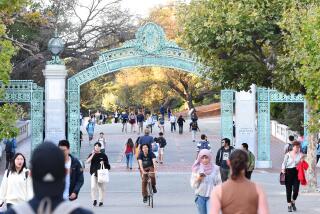Robertson-Backed Law School Wins Accreditation
- Share via
After a 10-year wait, Regent University School of Law has received full accreditation from the American Bar Assn.
The House of Delegates of the American Bar Assn. voted this month at its annual meeting to give the Virginia Beach, Va., school the new status, which adds considerably to a law school’s reputation.
“The fact that they acknowledge our overtly evangelical mission statement to me is a major breakthrough,” said religious broadcaster Pat Robertson, founder and chancellor of the school.
The accreditation comes after years of turmoil at the school on issues concerning tenure policies and academic freedom.
Three years ago, former dean Herbert Titus, a biblical conservative, was dismissed by Regent officials in what some considered to be an attempt to persuade the ABA that the university was a mainstream law school.
The law school, which was established in 1986, received provisional accreditation in 1989 and has undergone annual visits from an ABA evaluation team since then.
Robertson established what was originally known as CBN University in 1977, drawing its name from his Christian Broadcasting Network. The school later changed its name to Regent University.
Current law school Dean J. Nelson Happy said Regent focuses on the moral side of the practice of law, as well as its philosophical, practical and legal aspects.
The Regent University School of Law expects 150 new students this fall, the largest incoming class in its history. That would push its total enrollment to about 370 students.
Robertson said he expects the ABA decision to prompt more students to attend Regent. Many states do not allow graduates of unaccredited law schools to take licensing exams, using accreditation as a kind of quality control.
Ultimately, Robertson said, that will translate into greater influence for evangelicals in the legal profession.
“Evangelically trained scholars will be moving into positions as clerks for various judges, as members of legislative bodies and, of course, as practitioners of law around the country,” said Robertson, a 1955 graduate of Yale University Law School. And eventually, he said, “evangelical judges” will preside over many of the nation’s courts.
More to Read
Sign up for Essential California
The most important California stories and recommendations in your inbox every morning.
You may occasionally receive promotional content from the Los Angeles Times.













